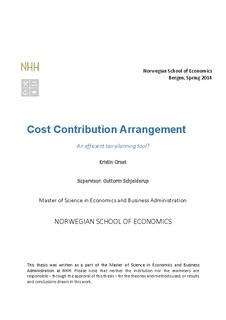| dc.description.abstract | This thesis sheds light on Cost Contribution Arrangements (CCAs) as a tax planning tool for the multinational enterprise. CCA is a framework agreed among enterprises to share costs and risks of developing, producing or obtaining assets, services or rights. Tax planning is choices of adaption within the legal framework of tax law with an economic goal of maximizing firm value. To reduce the tax burden many multinationals try to shift profits from high-tax to low-tax jurisdictions. This paper analyzes how the cost contribution structure can play an important part in achieving this. With a focus on the OECD Guidelines, the thesis examines current legislation and illustrate its weaknesses by analyzing a fictitious case. Results show that the main tax effects of employing the cost contribution structure in place of licensing stems from elimination of withholding taxes and from market prices being replaced by costs. The analysis further illustrates that the CCA structure is prone to manipulation as the allocation of costs to a large degree depends on assumptions, choices and subjective judgment. The OECD regulation requires consistency between contributions and expected benefits, however the valuation of these may pose difficulties. Contributions of preexisting intangible property and contributions in-kind are particularly problematic to value. Moreover, valuation of expected benefits depends on uncertain estimates: e.g. the economic life of the developed asset, the timing and the amount of the benefits. New participants entering and existing the arrangements presents additional challenges. The thesis shows that the cost contribution arrangement can be an efficient tax planning tool as it is based on estimates which easily can be over- and underestimated. I conclude that there is a need for improving the legislative framework and scrutinize the structure. As each case must be viewed in isolation, the process of controlling CCAs is an expensive and difficult task. | nb_NO |
